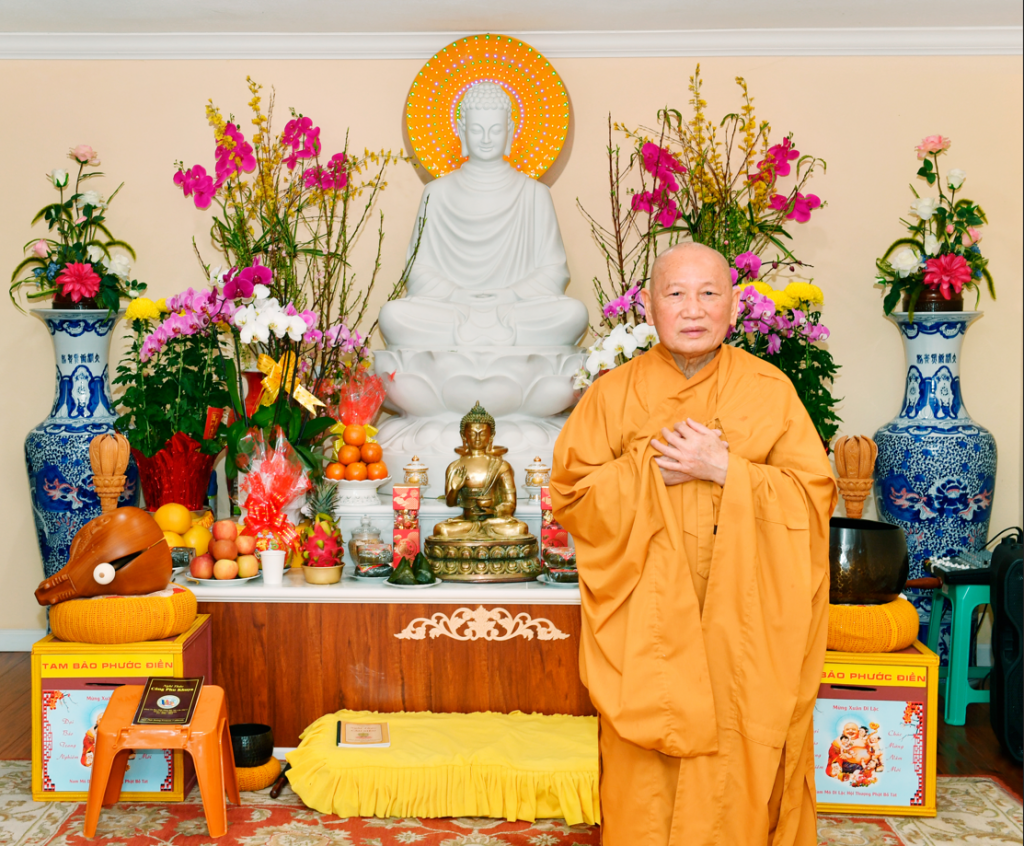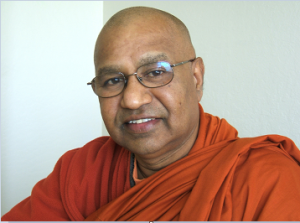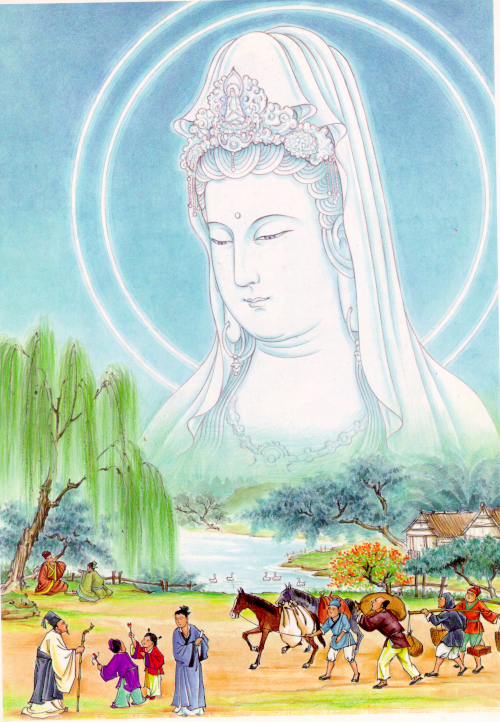
Foreword
Homage to the Great Kindness and Compassion Avalokiteśvara Bodhisattva, who listens to cries of suffering from living beings everywhere and immediately responds to them.
Dear respected Monks and Nuns,
Dear Buddhists,
During the COVID-19 pandemic, Sramanera Thông Đạo has been diligently studying and practicing the Five Hundred Names – Avalokiteśvara Bodhisattva. The result is a completed study spanning three different languages: Vietnamese, English, and Chinese.
Wherever there is Buddhism, there are certainly monks and lay Buddhists working together. According to the Mahayana Buddhism tradition, every year, temples would organize three celebrations to commemorate Avalokiteśvara Bodhisattva on the 19th of the lunar calendar in the months of February, June, and September. On these celebrations, Buddhists would eat vegetarian food, come to the local temple to listen to the Dharma, make offerings, and, most importantly, study in accordance with the virtues and merits of Avalokiteśvara Bodhisattva through the Five Hundred Names. These aspirations are filled with the virtues of the Four Immeasurables: Kindness, Compassion, Joy, and Equanimity.
Buddhism exists because living beings are enduring the cycle of Birth, Old Age, Sickness, and Death. If Buddhism exists, the Five Hundred Names also still exist; and, if the Five Hundred Names exist, Buddhists will study and practice according to the aspirations of the Bodhisattva path in general and Avalokiteśvara Bodhisattva in particular. Although the path of liberation is far away, we are peaceful and happy in the here and now. That is wonderful and due to the study and practice of the Bodhisattva’s Aspirations.
I praise the merits of Scramanera Thông Đạo, who has brought joy to himself and many others. His studies and practices have adorned the celebration to commemorate Avalokiteśvara Bodhisattva with greater brilliance and essence.
Đại Bảo Trang Nghiêm Buddhist Temple
The Celebration Avalokiteśvara Bodhisattva on Feb. 19, Tân Sửu Year (2021)
Most Venerable Thái Siêu
Preface

American Buddhist Seminary ABS Temple at Sacramento
423 Glide Ave., West Sacramento, CA 95691
Tele: (916) 371-8535, Fax: (916) 372-7650
Even as a Theravada monk I have always had a great deal of respect and adoration for Avalokiteśvara Bodhisattva, since I grew up in Sri Lanka knowing that Avalokiteśvara Bodhisattva is the manifestation of Maitreya, our future Buddha, according to our knowledge. My understanding has always been that Avalokiteśvara Bodhisattva has already fulfilled all the Paramitas to the highest capacity and that He is “waiting” in the Tusita Heaven for the Five Great Conditions to arise in the human realm so He can descend here and become the Buddha. Under this light, I have always translated the term Avalokiteśvara as, “the Lord of Waiting or the Lord of Watching.”
Because of the English translation compiled by the Samanera Thông Đạo, for the first time I was able to read all the Five Hundred Names of Avalokiteśvara Bodhisattva. Although the book is called the Five Hundred Names, it is actually a compilation of that many virtues or characteristics of a Great Being who is almost ready for the final birth as the Fully Enlightened Buddha (Samyak Sambuddha) in the near future. These virtues have been recited, studied, and contemplated by Buddhists in the Mahayana World over centuries in Chinese, Vietnamese, Japanese, Korean, Tibetan, and other languages. By doing so, they have shown a great deal of devotion to Avalokiteśvara Bodhisattva, and I believe that they have been fortunate to develop a much greater affinity to meet Maitreya Buddha in the future.
I am grateful to the Samanera Thông Đạo for translating these five hundred names into English. He has given the opportunity to the young Vietnamese generation who are growing up in America, and to many others who do not read Vietnamese, to understand the immense virtues of Avalokiteśvara Bodhisattva. It is a huge undertaking to publish the text in three languages: English, Vietnamese, and Chinese. My sincere wish is that, by reading, reciting, and practicing these virtues, many modern people may generate these virtues in themselves and thereby help the world to become a much more blissful place to live.
Besides the five hundred names, the text includes about the same number of well-written, detailed footnotes. Those footnotes are especially useful for anyone, be they beginners to Buddhism or veteran Buddhists. I would like to recommend this book to be used by all Dharma School Senior classes, especially at Dharma Schools that are being operated at many Vietnamese Temples in North America.
I deeply appreciate the time, effort, and dedication shown by Samanera Thông Đạo in preparing this amazing Dharma Dana. By doing so he definitely has accumulated a great deal of merit. May this merit be beneficial to him, his family, his supporting Dharma friends and their families to attain the supreme bliss of Nirvana.
Sincerely,
Venerable Madawala Seelawimala Mahathera
President, American Buddhist Seminary
Professor at the Institute of Buddhist Studies and Graduate Theological Union, affiliated with University of California, Berkeley.
Introduction

It is a pleasure to have the opportunity to write an introduction for Phô Duy Trần; he was my student at California State University, Sacramento in the early 2000’s. He graduated with the Degree of Master of Social Work with the thesis titled “Mindfulness Practices As a Bridge Between Vietnamese Parents and Their Children.”
Phô, like myself, found compatibility between the profession of social work and Buddhism. In my career, I only had the opportunity to supervise a couple of thesis that focused on that intersection, Phô’s commitment to that connection was striking and memorable. Phô was an exceptional student. His capacity to think and write in Vietnamese and English allows not only a translation of words but of beliefs in a way of being that transcends time and place.
Our time together as professor and student often strayed outside the boundary of thesis advising. Phô’s knowledge of eastern thought exceeded my relatively new passion for the western version of Buddhism. The depth of his knowledge often brought clarity to the cultural aspects of Buddhism that I was just beginning to understand. It is through that cultural lens that has allowed him to write, practice, and contribute not only to Buddhism but the melding of the profession of social work, into a way of being in the world that reflects his wisdom, kindness, and compassion.
I was very touched to know that Phô Duy Trần has been walking on the path of Buddhism as a novice named Thông Đạo. It is my pleasure to introduce Thông Đạo, the remarkable translator and annotator of The Five Hundred Names of Avalokiteśvara Bodhisattva Sutra. I hope you enjoy his writing as much as I have.
Robin Kennedy Ph.D., MSW.
Professor Emeritus
Division of Social Work
California State University, Sacramento
Acknowledgements

Namo Tassa Bhagavato Arahato Samma Sambuddhassa
The Five Hundred Names of Avalokiteśvara Bodhisattva Sutra is the collection of 500 Names. Each name, written in a rather long sentence, praises a vow, a merit, an encouragement, a reincarnation, or a mighty power of Avalokiteśvara Bodhisattva. Most names are quoted from the Thousand-Hand and Thousand-Eye Avalokiteśvara Bodhisattva’s Vast, Perfect, Unimpeded, Great-Compassionate Heart Dharani Sutra (266 Names). The remaining are quoted from many other Sutras. Due to the necessity to cite many sutras, there are similar or repeated sentences to respect the original idea of the Sutra.
His name symbolizes Wisdom and Compassion, the qualities of a future Buddha. In fact, He became a Buddha named True Dharma Brightness Tathagata a long time ago. Due to the compassion for living beings, He returned to life through countless lives and countless localities to save humanity. When He manifests in the innumerable forms according to the individual mind of each and every living being, He not only takes on noble or popular forms, but also shows animal forms, or scary appearances like Tiêu Diện Đại Sĩ who saves hungry ghosts. Towards ferocious beings, when gentle words are ineffective, He also uses powerful methods, miraculously transforms but never leaves compassion, wisdom, and great samadhi. Thanks to His kindness, compassion, and saving power, countless Dragons, Devas, Eight Clans’ Powerful Knights, and Good Deities vowed to support Him in helping living beings.
While praising the “thousand eyes illuminated” and “thousand hands supporting” of the Bodhisattva, the Sutra also devoted 18 sentences to remind practitioners to recognize their Buddha-nature (sentences 430-447). In addition to encouraging the recitation of the Great Compassion Dharani and reciting the names of Avalokiteśvara and Amitabha Buddha, the Sutra also suggests the practices of meditation and veneration of Sakyamuni Buddha. He also encourages practitioners to do good deeds to transform their evil karmas and for the sake of happiness and benefit of living beings.
According to many studies, the Five Hundred Names of Avalokiteśvara Bodhisattva Sutra was compiled by a Vietnamese Buddhist Monk (Anonymous). The researcher Quảng Minh thought that this Sutra first appeared from the Trần dynasty, based on the phrase “Inspiration of the Five Hundred Names” in the ritual of offering to hungry ghosts that prevailed in the Trần dynasty in the 13th century. The oldest inscribed wood version was archived under King Thành Thái in the summer of the year of Mậu Tuất (1898) by Xiển Pháp Pagoda at An Trạch Village, Hà Nội Province, Việt Nam. Despite my old age, I vowed to translate this precious Sutra into English to introduce it to the younger Vietnamese generation as well as English readers and to share the references with Buddhist practitioners.
I am very grateful to the Authors of outstanding reference works including the Great Compassion Dharani Sutra translated into English by Silfong Tsun, another Chinese version translated into Vietnamese by Venerable Thích Thiền Tâm, the Five Hundred Names of Avalokiteśvara Bodhisattva Sutra translated into Vietnamese by Quảng Minh, and Opening the Heart of the Cosmos by Zen Master Thích Nhất Hạnh along with many valuable documents from the Sutras, Dharma talks, dictionaries, books, articles, cassettes, videos, DVDs, and the Internet. The lack of contacting information has prevented me from requesting permission from the authors; however, I hope to receive their kind and compassionate understanding.
I sincerely bow to the Patriarch who compiled this Sutra and Those Who inscribed word by word on wood. My warmest thanks are to my respected Teacher Thái Siêu and the Venerable Monks who encouraged this translation. I am very appreciative that the Vietnamese Nôm Preservation Foundation posted this Sutra in Chinese on the Internet. I would like to thank: Nun Chief Thích Nữ Giới Hương, Nun Chief Thích Nữ Tịnh Quang, Chơn Hiền Tuệ, Phổ Vân, Ngô Kim Phương, Nguyễn Kim Cúc, Casey Romeo Từ Bi Tâm, Viên Hương, Đặng Đức Cương, Trần Duy Quang, Trần Thị Khánh Hiền, Ngô Thị Hạnh, Chúc Tiến, and many others who have helped with this translation. Particularly, I would like to express immense gratitude to the generous donors to print this Sutra.
Although I was very careful and did my best, it is impossible to avoid mistakes. I hope that the Venerable Masters, researchers, and practitioners will help improve this project.
Sincerely,
Thông Đạo
